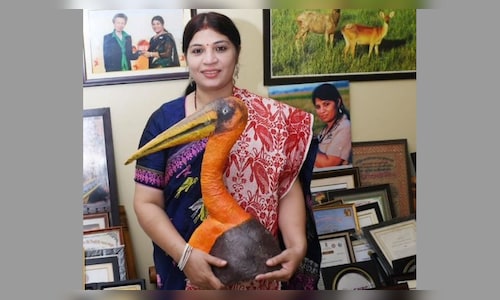The 45-year-old conservationist is the only Indian woman to feature on this year’s list that honours ‘extraordinary leaders’ working toward a better, more equal world, alongside 12 other global honorees.
Hailing from Assam’s Kamrup region, Barman attended Gauhati University, where she earned her master’s degree in Zoology with a concentration in Ecology and Wildlife Biology.
She has also served as a senior wildlife biologist at Aaranyak, where she oversaw the greater adjutant conservation project. Barman is also the Director of Women in Nature Network (WiNN) India and a member of the IUCN Stork, Ibis and Spoonbill Specialist Group.
According to Time Magazine, Purnima Devi Barman vividly recalls the day in 2007 when she learned that a tree housing a family of greater adjutant storks was being cut down in Assam, where she resides. Rushing to the site, she discovered a fallen nest with an endangered baby stork on the ground.
“Everyone surrounded me, started whistling at me,” she recalled. The greater adjutant stork, locally known as hargila (meaning ‘bone swallower’), is often found near waste dumps and is widely misunderstood. Driven by the need to protect the birds, Barman embarked on her mission to save the species – a cause that has now earned her global recognition.
“For the first time, I felt the importance—the call of nature. From that day, my mission started,” she added. Barman’s efforts to conserve the stork came at a time when the stork was critically endangered, with only 450 believed to be left in the region.
Due to her efforts, the stork’s status was upgraded from endangered to ‘near threatened’ by the International Union for Conservation of Nature in 2023. Their population in Assam has increased to around 1,800. Barman and her team of ‘Hargila Army’, which consists of 20,000 women, helped with the growth and rescue of the bird species.
In 2017, she received the highest civilian award for Indian women, ‘Nari Shakti Puraskar’, from former President Ram Nath Kovind. She also received the Whitley Award, often known as the Green Oscar, in the same year from Anne, Princess Royal of the United Kingdom.
The conservationist was also covered by National Geographic India.


